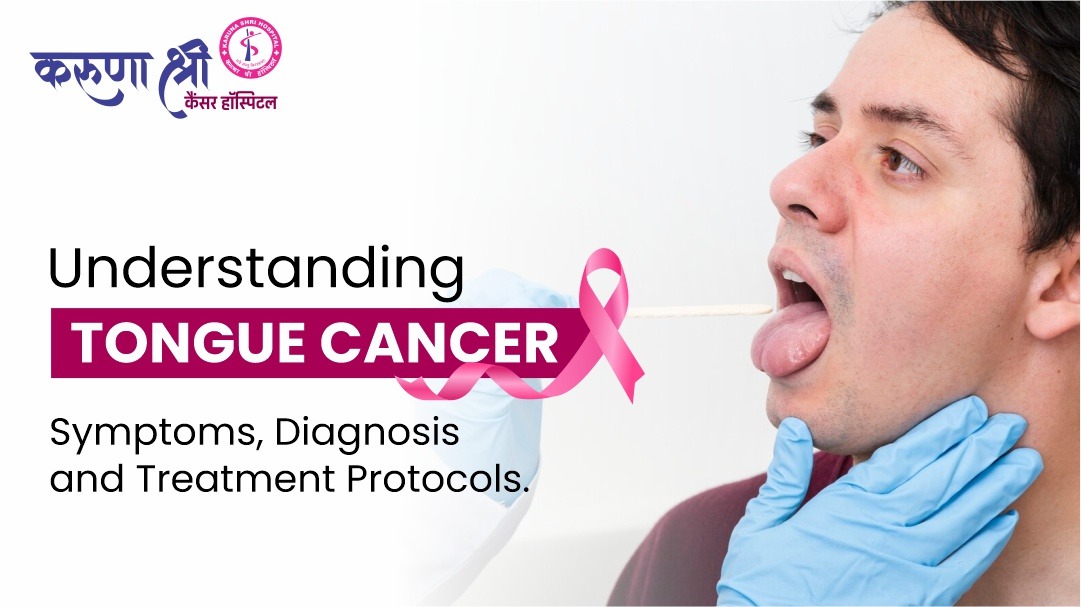By Dr. Prashant Kaser, Director, Karuna Shri Cancer Hospital, Raipur, Chhattisgarh
Tongue cancer, a type of head and neck cancer, affects many individuals worldwide. At Karuna Shri Cancer Hospital, we are dedicated to providing comprehensive care and the latest treatments for those affected by this condition. Understanding the symptoms, diagnostic processes, and treatment options for tongue cancer is essential for effective management and recovery.
Recognizing the Symptoms
Early detection of tongue cancer can significantly improve treatment outcomes. Here are some common symptoms to be aware of:
Persistent Sores: Non-healing sores or ulcers on the tongue, which may bleed easily and do not resolve within a few weeks.
- Lumps or Thickening: Any noticeable lumps, thickened areas, or rough spots on the tongue.
- Pain or Discomfort: Persistent pain or discomfort in the tongue or jaw, which may also be felt while chewing or swallowing.
- Red or White Patches: Red or white patches on the tongue or the lining of the mouth, which can be precancerous or indicative of cancer.
- Numbness or Tingling: Unexplained numbness or tingling sensation in the tongue or other areas of the mouth.
- Voice Changes: Changes in the voice, including hoarseness or a persistent sore throat.
- Difficulty Moving the Tongue: Problems with tongue movement, which can affect speech and swallowing.
The Diagnostic Journey
Accurate diagnosis is critical in developing an effective treatment plan for tongue cancer. The following steps are typically involved in diagnosing this condition:
- Physical Examination: A thorough examination of the mouth and throat by a healthcare provider to check for any abnormalities.
- Biopsy: If suspicious areas are found, a biopsy will be performed to remove a small sample of tissue for laboratory analysis to confirm the presence of cancer cells.
- Imaging Tests: Imaging techniques such as CT scans, MRI, or PET scans may be used to determine the extent of the cancer and if it has spread to other parts of the body.
- Endoscopy: An endoscopic examination allows doctors to view the inside of the mouth, throat, and other areas to identify any abnormalities.
Treatment Protocols
A Comprehensive Approach to Treatment for tongue cancer is tailored to the individual, considering the type, stage, and location of the cancer, as well as the patient’s overall health. Here are the primary treatment modalities:
- Surgery: Surgery is often the first line of treatment and may involve removing part or all of the tongue (partial or total glossectomy). Lymph nodes in the neck may also be removed if the cancer has spread.
- Radiation Therapy: High-energy radiation is used to target and kill cancer cells. It may be used alone or in combination with surgery and/or chemotherapy, particularly for advanced stages of cancer.
- Chemotherapy: Chemotherapy involves using drugs to kill cancer cells. It is often used in conjunction with radiation therapy (chemoradiation) to enhance the effectiveness of treatment.
- Targeted Therapy: Targeted therapy is a newer approach that uses drugs to specifically target cancer cells without harming normal cells. For example, cetuximab is a targeted therapy drug that can be used for certain types of tongue cancer.
- Immunotherapy: Immunotherapy helps the body’s immune system fight cancer. Drugs such as pembrolizumab and nivolumab have shown promise in treating advanced tongue cancer.
The Promise of Targeted Therapy
Targeted therapy represents a significant advancement in tongue cancer treatment. Unlike traditional chemotherapy, which can affect both healthy and cancerous cells, targeted therapy focuses on specific molecules involved in cancer growth. This precision reduces side effects and improves treatment efficacy.
Cetuximab, for example, targets the epidermal growth factor receptor (EGFR) present on the surface of some cancer cells. By blocking these receptors, cetuximab can help inhibit the growth and spread of cancer cells, offering a more tailored treatment approach.
Conclusion
Tongue cancer is a challenging disease, but advances in medical science have provided us with various effective treatment options. At Karuna Shri Cancer Hospital, we are committed to offering the best possible care, from early detection to the latest treatment protocols. By understanding the symptoms, undergoing timely diagnosis, and exploring all treatment avenues, we can improve outcomes and offer hope to those affected by tongue cancer.
For more information or to schedule a consultation, please contact Karuna Shri Cancer Hospital, Raipur, Chhattisgarh. Together, we can fight tongue cancer and work towards a healthier future

